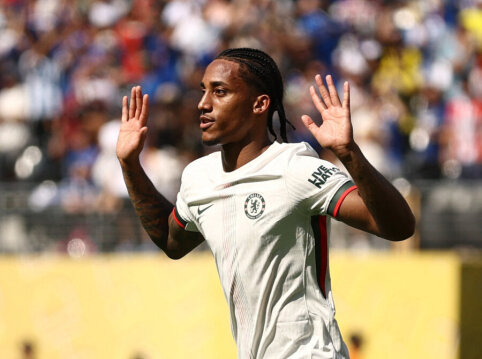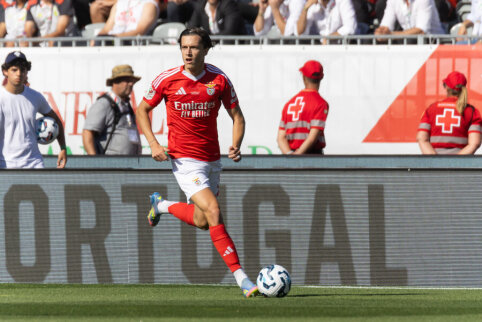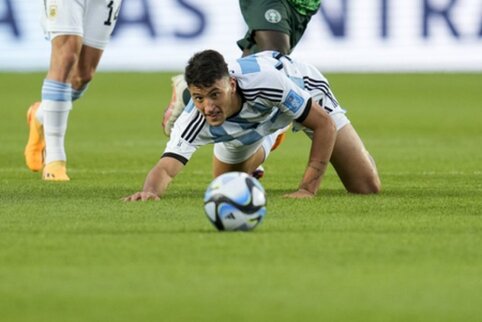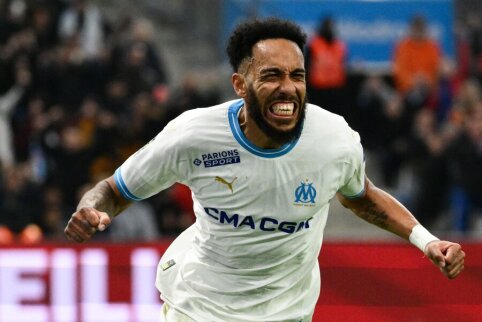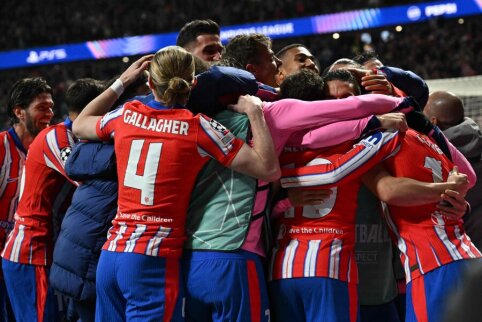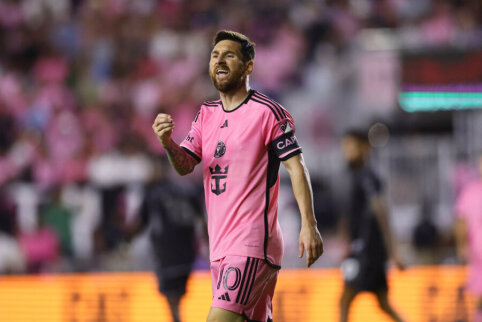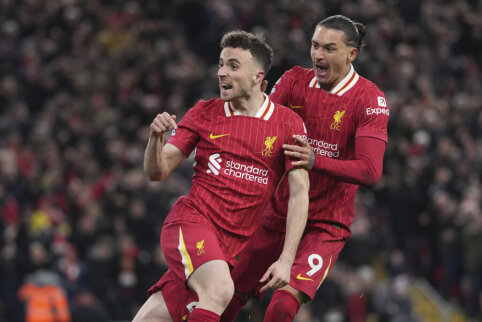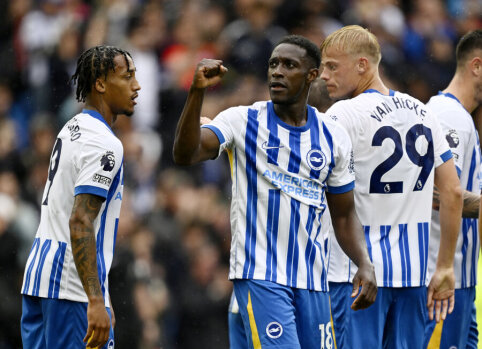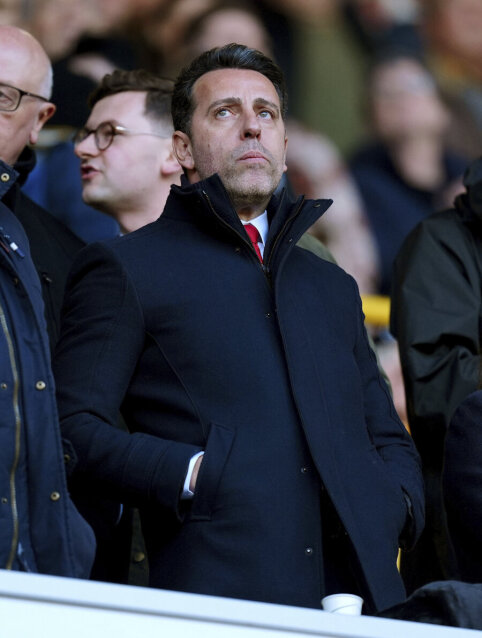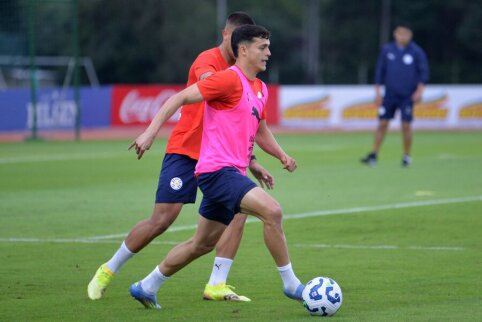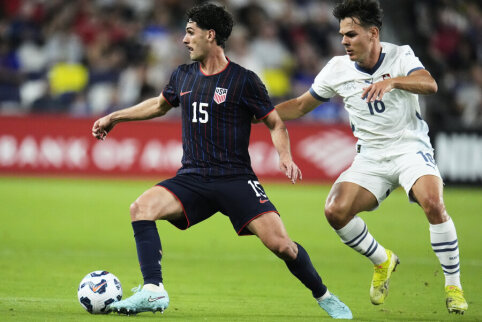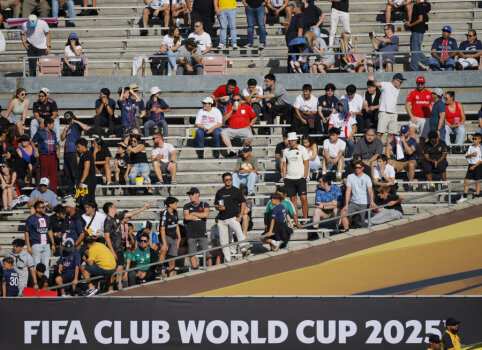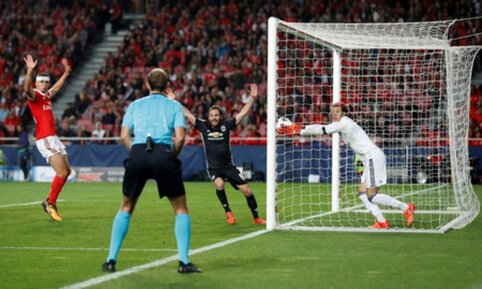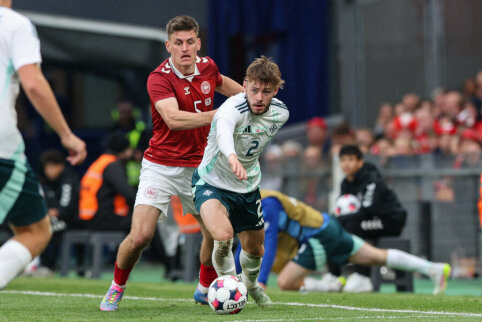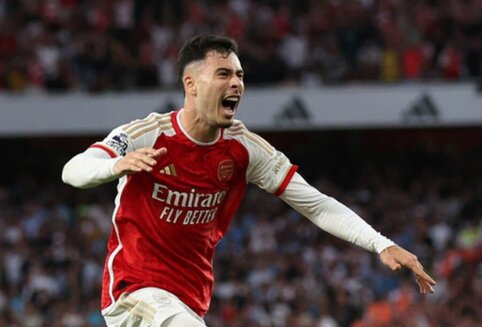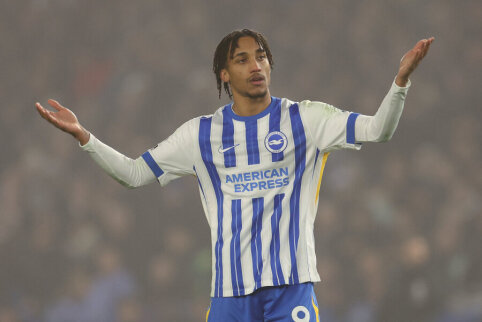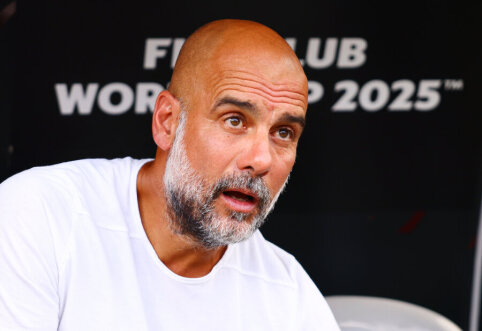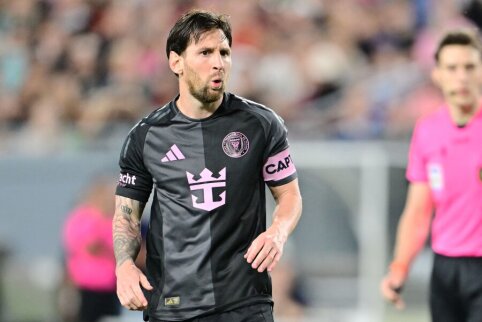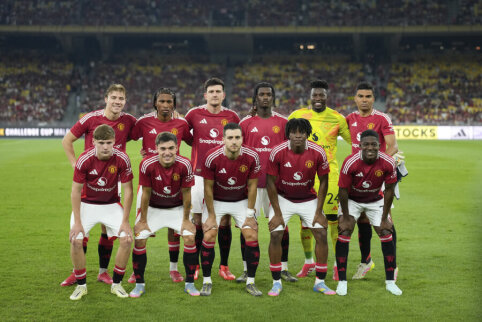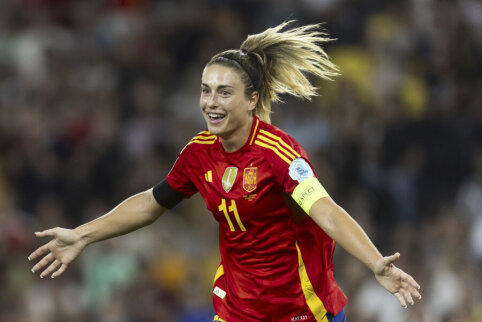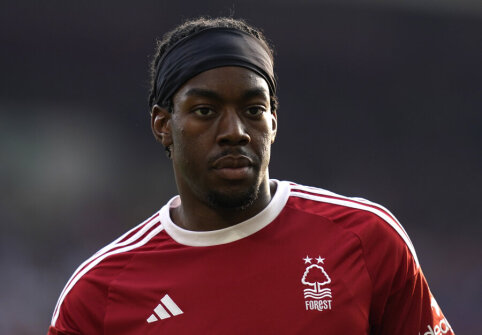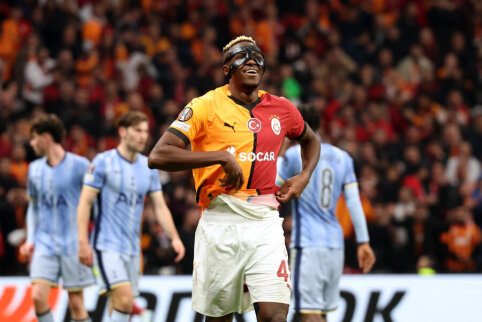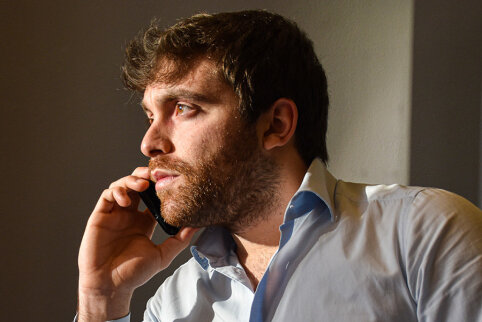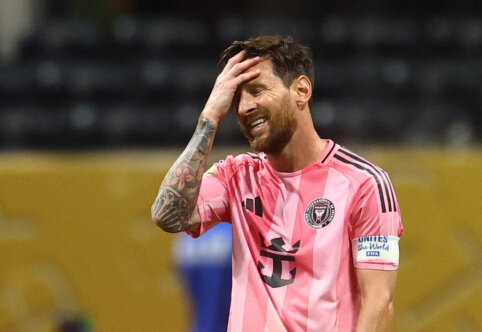 © EuroFootball.com
© EuroFootball.com
This month Joan Laporta was declared president of Barcelona uncontested and will continue to lead the Catalan club for at least another 4 years. "Tribune's" readers, Barcelona supporter Rokas suggests remembering how for the first time J. Laporta fought for the position of president in 2003. In this article, you will find hidden facts from Barcelona's history revealing the true behind-the-scenes of the presidential elections, Barcelona's battle with Manchester United for Ronaldinho, and J. Laporta's recipe for victory.
Socio No. 27 869
Joan Laporta was born on June 29, 1962 on La Diagonal, one of the busiest avenues in Barcelona.
From childhood, Joan's father would take him to "Camp Nou" - the stadium where Barcelona played - the pride symbol of all Catalonia. This view was forever etched in the imagination of the timid boy.
At the age of seven, the future president of Barcelona joined the club's youth football academy. It should be said that he was not a prodigy on the field: children's coach Jose Ramonas de la Cruz remembers that the not-so-tall Joan played it safe and often stumbled during training. The lack of talent was compensated by determination and diligence - he was the first to arrive and the last to leave the training sessions.
When Joan turned 15 and failed to make it to Barcelona C, it became clear that he would have to forget about a football career. J. Laporta struggled to overcome the first painful setback in his life: the usually friendly and energetic boy became a closed-up loner, who spent most of his time in his room crying from disappointment.
Then his father came to his aid. Knowing how much young Joanas loved Barcelona, his father promised that if he finally buckled down and focused on his studies, he would receive a royal gift for his 16th birthday - a Barcelona club membership card.
Joan's life took on a new goal, and he immersed himself in books. The boy studied so well that his father had nothing left to do but fulfill his promise. In June 1978, happily shining young Joan Laporta officially became Barcelona's socio No. 27,869.
He was consumed by a passion for learning. After finishing school, Joan entered the prestigious University of Barcelona and graduated from the Law Faculty with honors.
By the age of thirty, Laporta had become one of the most famous and best lawyers in Spain. Despite numerous offers, J. Laporta refused to work elsewhere and stayed in Barcelona. "I must love Catalonia very much and couldn't live anywhere else," said the lawyer at the time. Soon he opened his prestigious law office in Barcelona.
Laporta's career was also influenced by marriage. His wife became Constance Echevarria, the daughter of Juan Echevarria, former president of Nissan Iberica. A year later, the couple had their first child - a son named Polo, and soon after, two more - Guillermas and younger Joan.
Beautiful wife, three sons, a well-paid job, their own house on the coast of the Mediterranean Sea, a huge apartment in the center of Barcelona, recognition, and authority - it seemed like everything required for complete happiness. All goals, except one, had been achieved.
Childhood love continued to torment J. Laporta. The name of that love is "Barcelona".
As the summer of 2000 approached, mistrust and anger enveloped Barcelona. After President Jose Lluis "Emperor" Nunez resigned and coach Louis van Gaal stepped down, all of Catalonia was shocked by an unprecedented betrayal - former Barcelona favorite Luis Figo fled to Real Madrid.
The president of the super-club of Catalonia became former "Emperor's" right-hand man Joan Gaspart i Solves.
Upon leaving, J. Nunez left a huge legacy: more than 20 trophies and Barcelona's treasury brimming with income. Together with Manchester United, Barcelona were the richest clubs in the world.
However, with the arrival of J. Gaspart, everything turned upside down. In 2000, the new Barcelona president spent 84.8 million euros on buying players. Dutchman Marc Overmars, Spaniards Gerard, Alfonso, and Frenchman Emmanuel Petit joined the team.
But that was not all. In 2001, driven by some inexplicable desire to buy everything that moved with a ball, J. Gaspart began to shock Europe with his acquisitions. To buy new players, 98.8 million euros were spent, and the team was supplemented by Javier Saviola, Brazilians Geovanni and Fabio Rochemback, Frenchman Philippe Christanval, and Swede Patrick Andersson.
But the titles, as they say, were nowhere to be found. In 2002, Barcelona's financial resources were almost exhausted, and J. Gaspart cut the last euros from the budget to acquire Juan Roman Riquelme and lease Gaizka Mendieta and Juan Pablo Sorin.
As a result, in January 2003, one of the richest clubs in the world was hit by a deep financial crisis: the team's debts reached a record amount of 200 million euros, and the last title was won in 1999.
Furious Barcelona fans called J. Gaspart a "donkey" and the club's cultic group "Boixos Nois" openly declared that they would kill the club president. The hatred towards the Barcelona president was so great that several times attempts were made on his life.
On February 13, 2003, J. Gaspart, unable to bear the constant pressure and psychological tension, announced that he was resigning from the presidency of Barcelona.
Enrique Reina temporarily took charge of the club, but he immediately announced that he was not ready to be a permanent president. It became clear that in the summer of 2003, a new imperial election would take place in Barcelona.
The 2003 Barcelona presidential elections are often referred to as the "Crusade" or the "Journey to Jerusalem," drawing parallels between sanctity and uniqueness.
Meanwhile, the 2003 elections were really unique. Usually, there were three candidates: the incumbent president, the opposing candidate supported by a powerful Catalan family, and a third candidate who almost never had a chance of winning and was more "practicing" to run in the next elections.
In contrast, the 2003 elections featured six candidates. The main contender was considered Lluis Bassad, supported by the powerful Casa family of Catalonia, and endorsed by many journalists and columnists. L. Bassad also lured his future constituents with the promise of making club legend Josep Guardiola the sports director of the team.
Other candidates were thought to have just some chance of taking votes away from L. Bassad, but had no chance of winning. Businessmen Jaume Laurado, Jose Martinez-Rovira, Jose Maria Minguella, and Jordi Majo also pretended to run for the presidency. The sixth candidate was Barcelona lawyer Joan Laporta.
It was not the first time that J. Laporta had fought against the then powers-that-be at Barcelona, but this time he ran in the elections as a real candidate, rather than just endorsing one of the contenders.
In 1990, J. Laporta joined the radical alliance "Blue Elephant," and a few years later became its leader.
This alliance fiercely opposed Josep Nunez's policies and always endorsed his opponents during the elections, albeit unsuccessfully: in 1997, the "elephants" supported Angel Fernandez, but J. Nunez won, in 2000, they supported L. Bassat, but J. Gaspart won.
Two losses did not break J. Laporta. He started looking for his own followers. Soon, the well-known lawyer was surrounded by experienced, but most importantly, young and successful entrepreneurs who, like him, fanatically loved the Barcelona club.
All of them promised to dedicate the best years of their lives to one goal - Barcelona.
On May 15, 2003, the first public opinion poll was conducted to determine who was the most viable candidate for the Barcelona presidency. L. Bassad led by a huge margin. J. Laporta lagged in a complete outsider position.
Exactly two weeks later, on the last day it was possible to do so, J. Laporta introduced his team to the voters and announced the election program. His slogan was "Primer, el Barça!" (First - "Barça!").
Thus, on June 1, 2003, Barcelona's socio No. 27,869 began his personal battle.
The whole truth about the 2003 elections
The first point of J. Laporta's election program declared that in the event of the leader of the "Blue Elephant" victory, a massive cleaning of ranks would be carried out at the club. J. Laporta also promised to immediately conduct a global audit of the club's finances and disclose the results publicly. "If we find any financial machinations or crimes, we will not remain silent," declared J. Laporta, who also did not forget that the club had to save money.
"I will return you the spectacle at 'Camp Nou' and democratize 'Barça'", he said in a television debate show - "This club is my entire life".
The television debate shows became the key to J. Laporta's victory. Always tactful, upbeat, and smiling, the candidate did not even try to denigrate and accuse his opponents, who were at the time unabashedly making various allegations against each other.
Unlike other candidates, J. Laporta consistently emphasized that the most important thing for him was working with the team. If the conversation turned to club sports interests, alongside Laporta was always Sandro Rosell, a former "Nike" representative in South America, if it was about financial affairs, Laporta always leaned on the experienced "blue elephant" Ferran Soriano. Other team members were Alfons Godallis, Vicenzo Vives, and Marc Ingla.
In public opinion polls, J. Laporta outstripped other candidates one by one, and with a week left, he firmly held second place, barely behind L. Bassat.
There is a version that J. Laporta won the elections when he announced that Barcelona would attract David Beckham, but everything happened a little differently.
The future Barcelona president never said that his main goal was to buy the English defender; rather, it was the official Manchester United website that announced the news that S. Rosell, J. Laporta's representative, officially inquired about how much it would cost to buy D. Beckham.
Receiving a response that "MU" would be willing to part with its star for 40 million pounds, S. Rosell thanked them and promised to get back in touch if J. Laporta won the elections.
Indeed, J. Laporta's victory in the elections was rumored to come when Johan Cruyff was interviewed in a well-known Catalan newspaper "Sport". It should be noted that it was not J. Laporta himself who gave the interview.
"Who will you vote for in the upcoming elections?" the journalist asked the interlocutor. "For Joan Laporta," replied the legendary Johan Cruyff without hesitation, "That man will rejuvenate 'Barça' and conquer Europe with it."
The next day it was clear that Joan Laporta's personal attorney was Johan Cruyff. This interview determined the outcome of the elections, as the legendary Dutchman is revered by the Catalans.
The election results were announced late on the night of June 15, 2003, but in Catalonia, nobody even thought about sleeping.
Laporta received 987 votes; J. M. Minguella - 1867; J. Martinez-Rovira - 2388; J. Majo - 2490, and L. Bassat - 16,412.
With 27,138 votes, Joan Laporta was officially declared the president of Barcelona.
The new power
At four in the morning, Joan Laporta and his team arrived at 'Camp Nou'. The press conference room at the stadium was packed with journalists. The new president, smiling, raised two fingers - a sign of victory. There was no more strength to give a normal interview. "I am very happy. My goal is to make 'Barcelona' the best," Laporta said.
Meanwhile, Barcelona was jubilant. The fields, streets, and squares echoed: "Laporta president! Catalonia independent!"
Despite the sleepless night, at 8 o'clock in the morning, Joan Laporta arrived at the 'Barcelona' headquarters. Immediately, all employees in the club were fired.
"I don't need nineteen deputies," J. Laporta declared immediately. (During J. Gaspart's time, there were 19 vice presidents in 'Barça' - ed.).
Just seven hours later, J. Laporta was presented with a report on the club's situation. It turned out that Barcelona had 107 thousand socios, 210 million euros in cash, and a debt of 350 million euros. The new president was shocked - he did not expect such a financial abyss. The club, which just four years ago was considered one of the richest, was now balancing on the brink of bankruptcy.
At the same time, Marc Ingla, turning on his heel, visited several Barcelona banks, and because 'Barça' couldn't answer in Catalonia, he soon borrowed 150 million euros.
It was clear that if 'Barcelona' did not succeed in the near future, the club would simply go bankrupt.
Do not lurch and grab!
Shortly after the victory in the elections, J. Laporta called a person responsible for 'Barça' affairs in England and reported two more shocking news: firstly, that Madrid's 'Real' made an offer to D. Beckham and he did not want to hear about 'Barcelona', and secondly, that Manchester United had already agreed with Ronaldinho to move to the English club.
Realizing that both players would not "fall into the trap" immediately, J. Laporta chose Ronaldinho and immediately sent Sandro Rosell to Paris, who personally knew Ronaldinho's brother, who worked as the player's agent.
The work was in full swing. As soon as S. Rosell, Ronaldinho, and his brother sat down to lunch in a Paris restaurant, J. Laporta struck by dialing Ronaldinho's price down to 40 million euros, while S. Rosell, having lunch with Ronaldinho, managed to lower the player's value to 27 million euros compared to the 50 initially requested.
That evening, S. Rosell, Ronaldinho, and his brother flew to Barcelona, while Manchester United seethed with anger. J. Laporta won his first battle.
S. Rosell, not wasting time, ordered tickets for the Brazilian and his brother to fly to Barcelona and rushed straight to the PSG headquarters. At the same time, Laporta managed to knock the price down for Ronaldinho to 40 million euros over the phone, and S. Rosell personally met with F. Graille to further reduce the price - 'Barca' promised PSG 27 million euros for Ronaldinho instead of the 50 initially demanded.
That same evening, S. Rosell, Ronaldinho, and his brother flew to Barcelona, and Manchester United fumed in anger. J. Laporta won his first battle.
Mr.
With the discovery of the player around whom the team would be formed, the candidacy for head coach once again became a priority. Renowned specialists did not want to travel to the Catalan capital, while both Txiki and Rosell advocated for Radomir Antic to remain in Barcelona for another season. However, their intentions differed - Rosell wanted to invite Felipe Scolari to 'Barca', while Txiki proposed R. Koeman.
Seeing the disagreements, J. Laporta called Johan Cruyff and asked for advice. The Dutchman, after a short pause, suggested his compatriot Frank Rijkaard.
That same day, "Barcelona" got a new "Mister." His assistant was Henkas Ten Cate, who had previously led the "NAC Breda" club, and the goalkeepers were trained by Carlos Unzue. The coaching staff also included Eusebio and G. Amor.
The newly formed coaching staff immediately began to shape the team. Barcelona saw the departure of 12 players: Roberto Bonano, P. Christanval, Dani, Frank de Boer, Nano, J. R. Riquelme, F. Rochemback, J. P. Sorin, and others.
The club was joined by 12 new players: Ronaldinho, Ricardo Quaresma, Rafael Marquez, Luis Garcia, Giovanni van Bronckhorst, goalkeeper Rustu, and others. In January, Barcelona was reinforced by loaned Edgar Davids, and the application included canteros Albert Jorquera, Sergio Garcia, and Santamaria.
The team began the new season in 2004.
The first bloodshed and the first victories
Joan Laporta began the 2005-2006 season with a heavy heart. S. Rosell's departure did shake the club, but the Barcelona president tried to quickly forget the past disagreements and focus on team matters.
Before the season, D. Albertini, Damia, Fernando Navarro, and Gerard left the club, while Mark van Bommel and Santi Ezquerro arrived. The young L. Messi signed his first professional contract with the club. Nine canteros were promoted to the first team: Rodri, Jordi, Montaneses, Ludo Silvestre, Olmo, Orlandi, Ramonas, Pitu, and Martos.
The season started with a victory in the country's Super Cup, but the start of the league did not bode well. Quickly, the club picked up the pace and won 18 games in a row, improving the league's record.
In September 2005, J. Laporta was elected as the president of the G-14, an organization that unites the most influential European football clubs.
In November 2005, 'Barcelona' defeated the local 'Real' in Madrid 3-0, leading to Spaniards applauding 'Barca' for their overpowering performance.
Laporta has fond memories of those events
